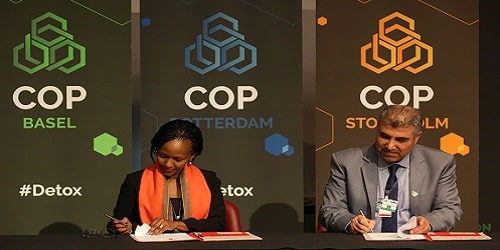In Geneva International Conference Centre (CICG) Geneva, Switzerland, the 14th meeting of the Conference of the Parties to the Basel Convention (BC COP-14), the 9th meeting of the Conference of the Parties to the Rotterdam Convention (RC COP-9) and the 9th meeting of the Conference of the Parties to the Stockholm Convention (SC COP-9) held from April 29 to May 10, 2019. The theme of the meeting was “Clean Planet, Healthy People: Sound Management of Chemicals and Waste”. In the meeting, 187 countries pledge to restrict the global plastic waste but United States has refused to take part in this pledge.
 Key Highlights
Key Highlights
i. The 14th meeting of the Conference of the Parties (COP-14) to the Basel Convention has taken the view to address environmentally sound management (ESM) of waste. The purpose is to develop technical guidelines on waste generated from electronics (e-waste), persistent organic pollutants (POPs), lead acid batteries and mercury as well as certain hazardous waste treatment methods.
ii. COP-14 has discussed among parties about matters related to implementation of the Convention which include the strategic framework entry into force of the Ban Amendment and the Cartagena Declaration on the Prevention, Minimization and Recovery of Hazardous Wastes and other wastes.
iii. According to the framework agreed in the 11th meeting of the Open-ended Working Group (OEW G11) of the Basel Convention held from September 3 to 6, 2018 in Geneva and the outcomes from the COP-14 include:
- A proposal to set up a new partnership on plastic wastes.
- Development of technical guidelines on e-waste.
- Possible amendments to the Convention’s annexes with regard to solid plastic wastes.
- Consultations on four draft guidance documents.
- Enhanced cooperation with the World Customs Organization (WCO).
About Basel Convention
- It is also known as the Basel Convention on the Control of Transboundary Movements of Hazardous Wastes and Their Disposal.
- It is an international treaty and the aim of this treaty is to reduce the movements of hazardous waste between nations and specifically to prevent transfer of hazardous waste from developed to less developed countries (LDCs).
- Till now, 187 parties and 53 signatories to the treaty.
About Rotterdam Convention
- It is also known as the Rotterdam Convention on the Prior Informed Consent Procedure for Certain Hazardous Chemicals and Pesticides in International Trade.
- The aim of this treaty is to promote shared responsibilities and cooperative efforts among parties in the international trade of certain hazardous chemicals in order to protect human health and the environment from potential harm and also contribute to environmentally sound use of these chemicals.
- Till now, 161 parties and 72 signatories to the treaty.
About Stockholm Convention
- It is also known as the Stockholm Convention on Persistent Organic Pollutants.
- It is an international treaty and the objective of the treaty is to eliminate or restrict the production and use of persistent organic pollutants (POPs).
- Till now, 182 parties and 152 signatories to the treaty.




